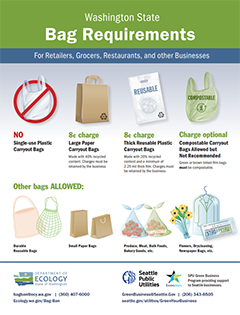Washington State Bag Requirements
As of January 2021, Washington State adopted a statewide bag ban that adds new requirements for Seattle businesses that use carryout bags. The new bag ban, which was put on hold due to the COVID-19 pandemic, is fully effective as of October 1st, 2021. The goal of the new ban is to reduce pollution in Washington's recycling facilities, waterways, and roadways.
In addition to grocery and retail stores, food service businesses, including restaurants, must comply with the bag ban. Statewide law does not exempt them. We encourage businesses to begin transitioning to the law's new requirements as soon as possible.
|
Download Bag Ban Flyer (PDF) |
Department of Ecology Bag Ban Tool Kit and Translated Flyers Available in the following languages: አማርኛ (Amharic) |
Details about the requirements
- The Washington statewide plastic bag ban becomes effective on October 1, 2021 and preempts the Seattle law. The law is intended to create consistent policy and fees across the state.
- The new law prohibits single-use plastic carryout bags in all food service businesses, including retail and grocery stores, restaurants, takeout establishments, festivals, and markets.
- An $0.08 charge is required for all large paper bags and thick reusable plastic bags.
- The law requires retail stores to show all bag-charges on customer receipts; stores keep all revenue. The charge is a taxable retail sale.
- The law specifies that produce bags and thick reusable plastic bags cannot be printed with the words "biodegradable", "degradable", or "decomposable".
- Plastic bags cannot be tinted green or brown unless they are certified compostable.
- The law requires all retail-provided paper bags to contain a minimum of 40% post-consumer recycled content and to meet composting requirements.
- The law requires all reusable bags made of plastic film to contain 40% post-consumer content and be at least 2.25 mil thick.
- Compliant paper and reusable plastic film bags are required to be labeled with the post-consumer content specifications.
- This law imposes a $250 fine for repeated violations.
- The ban does not apply to food banks and food assistance programs. However, those programs are encouraged to take actions to reduce the use of single-use plastic carryout bags.
Exemptions
- The fee may not be collected from anyone using a voucher or electronic benefits card issued under the Supplemental Nutrition Assistance Program (SNAP), Women, Infants and Children (WIC), Temporary Assistance for Needy Families (TANF), or Food Assistance Program (FAP).
- Plastic bags used in stores for bulk items or to protect vegetables, meat, frozen foods, flowers and similar items are exempt. Plastic bags cannot be green or brown tinted. Approved compostable bags are permitted for these purposes.
- Plastic dry-cleaner, newspaper and door-hanger bags are allowed but cannot be tinted green or brown.
- Plastic bags sold in packages containing multiple bags intended for use as garbage bags or to contain pet waste, or approved compostable food and yard waste bags are exempt.
- Businesses are allowed, at their discretion, to charge for compostable bags and smaller bags or provide them for free.
Additional information
- 2020 Bag Ban Update Memo (pdf)
- 2019 Bag Ban Update Memo (pdf)
- 2018 Bag Ban Update Memo (pdf)
- 2017 Bag Ban Update Memo (pdf)
- Point of purchase card #1 (pdf) - Paper bags only
- Point of purchase card #2 (pdf) - Reusable plastic bags only
- Point of purchase card #3 (pdf) - Paper & compostable bags
- Point of purchase card #4 (pdf) - Reusable plastic & compostable bags
- Point of purchase card #5 (pdf) - Paper & reusable plastic bags
- Point of purchase card #6 (pdf) - All bags
- Bag supplier list (pdf) - For retailers seeking paper and thick plastic bag alternatives
If you have questions, please contact Seattle Public Utilities’ Green Business Program at GreenBusiness@seattle.gov or (206) 343-8505. When the bag ban goes into effect on October 1, 2021, anyone may submit an observation of businesses not in compliance with the new requirements using the reporting form on the Washington State Department of Ecology’s website. The Department of Ecology will use this information to follow up with businesses to ensure their understanding of the new law. Repeated non-compliance may result in penalties.
